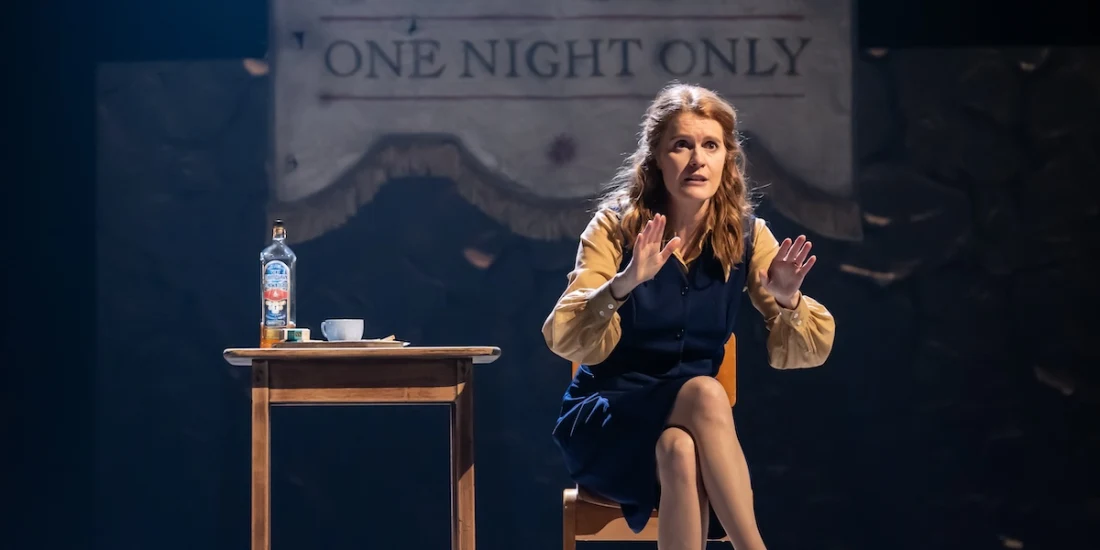'Faith Healer' review – Rachel O’Riordan’s scorching revival of Brian Friel's play is the best production in years
Read our review of Faith Healer, starring Justine Mitchell, Declan Conlon and Nick Holder, now in performances at the Lyric Hammersmith to 13 April.
Brian Friel’s 1979 play Faith Healer may have been a Broadway flop, but its status as a 20th-century masterwork has long ago been established and is confirmed afresh in Rachel O’Riordan’s scorching revival for the Lyric Hammersmith – the theatre she runs.
Four monologues divided amongst a trio of characters – pre-eminently the itinerant Irishman, Frank Hardy, whose soliloquies frame the play – Friel’s devastating excavation of three blighted souls can sometimes feel like a theatrical geometry test: what from the different narratives we are hearing is true, embroidered, or flat-out false, and how do the characters’ sometimes conflicting stories connect up?
But O’Riordan and her exceptional cast dig deeply into a psychic landscape whose scorched quality finds a visual correlative in Colin Richmond’s gradually imposing, cracked-earth set.
You feel the shifting sands in relationships that are restorative at times, ruinous at others. And O’Riordan cleverly forestalls the tedium that can attend this sort of drama by leaning into the play’s element of suspense. What actually did happen to Frank (Declan Conlon) that fateful August evening at a pub in Ballybeg – this writer’s preferred, if fictional, County Donegal location?
How, too, has the fallout from the encounter affected Frank’s wife Grace (the peerless Justine Mitchell) and long-time manager Teddy (Nick Holder)? Anna Clock’s sound and Paul Keogan’s lighting help cue the grievous reckoning toward which the play builds, but a long (two hrs 45 minutes) and entirely riveting evening would be nothing without a cast fully committed to the play’s cataclysms, large and small.
We first hear from the heavy-drinking Frank, whom Conlon invests with a bravado that may itself be part of his act. Referencing “those dying Welsh villages” that have featured on his geographically wide-ranging tour of healing, this Frank leans into the word “dying” as if he knows a thing or two about that word himself.
And what of his gift for dispensing balm, which doesn’t work most of the time, he tells us, though “occasionally” it does? Is Frank charlatan or saviour, conman or genius? And how is his gift, if indeed he has one, viewed by the very public he has come to cure?
Conlon is terrific: firm-voiced and possessed of a confidence, however misplaced, that leads to a final mock-triumphant gesture by which point the character is so lost within his own head that he’s long ago lost any grip on reality.
Along come Grace and Teddy to offer their own versions of events, starting with factual correctives to Frank’s lies. They go on to lay bare a desolation made that much more poignant by their awareness of the very abyss to which Frank, on some level, remains oblivious.
Mitchell was a standout in last year’s National Theatre revival of Friel’s Dancing at Lughnasa, and she is quite simply beyond praise here.
Emerging from a sea of cigarette smoke, lost in thrall to a depth of despair to which we then become privy, this Grace communicates an abiding affection for her husband that exists no matter how malignantly he treats her: we soon discover that Frank has misrepresented his wife’s nationality, marital state, and capacity for child-bearing as part of an ongoing evisceration with which the adoring if abject Grace will never make peace.
Holder’s bear-like Teddy – an emotionally expansive Cockney with a fondness for the phrase “dear heart” – is bigger, both physically and temperamentally, than were such noted Teddys over time as Ron Cook and Ian McDiarmid. But Holder’s outsized quality pays off once the actor pulls back to reveal scars borne out of that curious amalgam of anger and affection that this surpassingly intricate play maps so well. (You're aware, too, that Teddy's fondness for drink rivals Frank's.)
It’s no surprise, I suppose, that Teddy first greets us singing the Jerome Kern song “The Way You Look Tonight”, whose apparent jauntiness over the course of the play comes to seem deeply jarring. Teddy is a natural entertainer himself, so understands Frank’s need to seduce an audience – if not his moral rot.
Let’s just say that not since the vaunted Royal Court revival of Faith Healer more than 30 years ago has this play looked so good. No, dear hearts, make that indispensably great.
Faith Healer is at the Lyric Hammersmith through 13 April. Book Faith Healer tickets on London Theatre.
Photo credit: Faith Healer (Photo by Marc Brenner)
Originally published on

